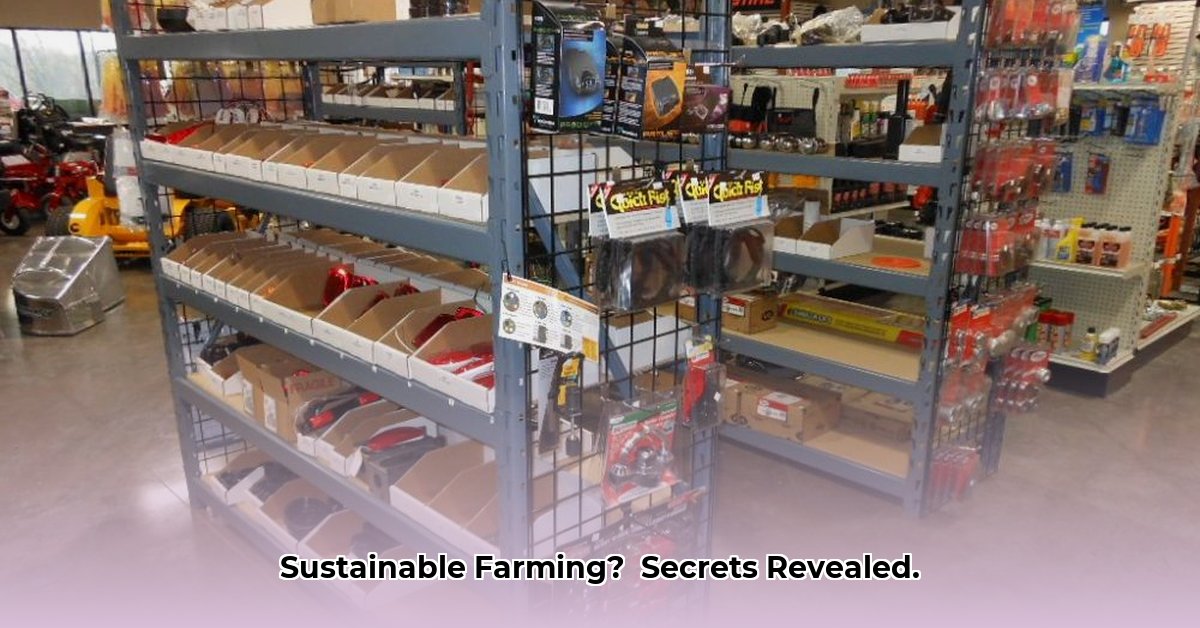
Pauls Valley Tractor Supply: Partnering for Sustainable Agriculture
Pauls Valley farmers face the dual challenge of profitability and environmental stewardship. Balancing these competing priorities can seem daunting, but Tractor Supply Company (TSC) plays a significant, albeit indirect, role in supporting sustainable farming practices in the region. This guide explores how TSC contributes to a greener agricultural future, offering actionable advice for farmers, TSC itself, and the broader community. For more on sustainable farming equipment, check out these grass seeders.
Understanding Tractor Supply's Role in Sustainable Agriculture
Tractor Supply isn't solely focused on sustainable agriculture, but its vast inventory of supplies—from seeds and fertilizers to animal feed and equipment—supports a wide range of farming practices, including those focused on environmental responsibility. However, TSC's direct impact on sustainability is dependent on the choices of its customers, the farmers themselves. This emphasizes the importance of informed decision-making at every stage of the process. Isn't it crucial to understand how your choices impact the long-term health of your land and the community?
Making Sustainable Choices at Tractor Supply: A Practical Guide
Navigating Tractor Supply for sustainable products requires a proactive approach. While explicit "eco-friendly" labeling isn't ubiquitous, several strategies can help you make informed choices:
Step 1: Define Your Sustainability Goals. Before shopping, clearly identify your specific objectives. Are you aiming to reduce water consumption? Prioritizing organic feed? These goals will guide your product selection.
Step 2: Targeted Product Searches. Utilize TSC's online and in-store resources to search for products aligning with your goals. Look for keywords like "organic," "recycled," or "water-efficient." For example, searching for "organic hay" or "drip irrigation systems" will yield more relevant results.
Step 3: Engage with TSC Staff. Don't hesitate to ask questions! Inquire about product sourcing, manufacturing processes, and sustainability initiatives. While they may not be agricultural sustainability experts, their knowledge of TSC's inventory can be invaluable in identifying suitable options.
Step 4: Comparative Shopping. Don't limit yourself to TSC. Compare prices and product details with other suppliers to find the best combination of sustainability and value.
Step 5: Advocate for Change. If you consistently find a lack of sustainable options, voice your concerns. Contact customer service or write a letter expressing your needs and suggesting specific improvements. Your feedback directly influences TSC's future product selections and sustainability initiatives.
Key Strategies for Sustainable Farming with TSC: A Collaborative Approach
Building a sustainable agricultural future requires collaboration. Here's how farmers, TSC, and the community can work together:
For Farmers:
- Prioritize Sustainable Products: Whenever feasible, choose products from suppliers committed to sustainable practices, even if it means a slightly higher upfront cost.
- Demand Transparency: Encourage TSC and other suppliers to be transparent about their sourcing and production methods. Ask questions about their supply chains. This helps ensure everyone is on the same page.
- Embrace Innovative Practices: Research and adopt new, sustainable farming techniques. Attend workshops, consult educational resources, and share knowledge with other farmers.
For Tractor Supply:
- Transparent Sourcing: Regularly audit supplier practices to ensure environmental standards are being met. This enhances consumer trust and demonstrates TSC's commitment to sustainability.
- Investing in Education: Offer workshops, online resources, or in-store materials educating farmers about sustainable practices.
- Expand Sustainable Product Offerings: Actively seek out and stock a wider range of sustainably produced products. This creates a greater selection for farmers committed to environmentally conscious farming.
For the Community:
- Support Local Farmers: Buy local produce and meat whenever possible. This fosters sustainable agricultural practices within your community.
- Advocate for Change: Contact TSC and other retailers to express your preference for sustainable products and practices. Collective advocacy drives positive change.
- Get Involved: Participate in community initiatives promoting sustainable agriculture. This demonstrates support for your local community's long-term health.
Mitigating Risks in Sustainable Agriculture
Sustainable farming presents certain challenges. Here are some common risks and mitigation strategies:
| Technology/Practice | Potential Risks | Mitigation Strategies |
|---|---|---|
| Conventional Fertilizers | Soil degradation, water pollution | Explore organic fertilizers, precise application techniques |
| Livestock Feed Sourcing | Antibiotic resistance, unethical practices | Verify supplier commitment to ethical and sustainable methods |
| Fuel-Intensive Equipment | High fuel costs, greenhouse gas emissions | Invest in energy-efficient equipment, explore rental options |
| Water Management in Agriculture | Water scarcity, drought, pollution | Implement efficient irrigation, water harvesting, conservation |
| Potential for Soil Degradation | Reduced crop yields, erosion, biodiversity loss | Implement cover cropping, no-till farming, crop rotation |
Building a sustainable future is an ongoing process that requires continuous learning, adaptation, and cooperation among all stakeholders. By working together, we can foster a more prosperous and environmentally responsible agricultural future for Pauls Valley. https://www.tractorsupply.com/tsc/store_PaulsValley-OK-73075_1741